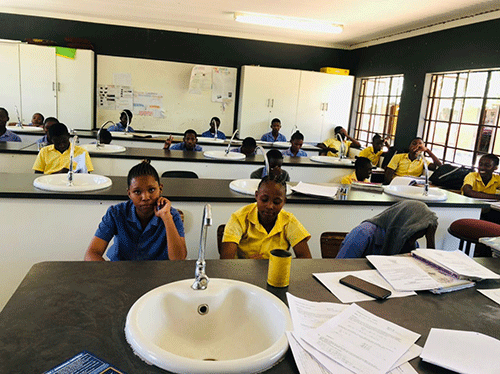ONGWEDIVA – As the temperature rises on sunny days, the heat becomes unbearable for drenched teachers and learners at Tsintsabis Combined School, but they have no choice but to continue with lessons in their cramped classrooms of over 50 pupils.
The Tsintsabis Combined School in the Oshikoto region was established in 1993 to provide access to education, especially to children from the marginalised San community.
The school, which was built to accommodate only about 135 learners, is now catering to 779 learners.
The school is characterised by overcrowded classrooms, a lack of ablution facilities and inadequate school and hostel infrastructure.
All of these factors ultimately lead to poor educational outcomes, as it strains learners’ ability to learn and receive a quality education.
This was revealed by the school principal, Martin-Olembe Antindi, in a telephonic interview with New Era.
Antindi said the pupils squeeze themselves into a single classroom and they sometimes resort to staying home due to the overcrowding.
“The school currently has overcrowded classrooms that hinder quality teaching and learning,” he told New Era.
Antindi indicated the school’s overcrowdedness is contributed by the fact that it is the only school catering to the marginalised community in Tsintsabis and the surrounding farms, and it is the only school that offers Khoekhoegowab as a subject in the Oshikoto region.
“Currently, in grade four, we have 111 learners in two classrooms (56 and 55 learners per class), grade five with 101 (50 and 51 per class) and grade seven with 54 learners. Grade three has two classes each with 53 learners. This compromises quality teaching and learning, since learners are congested,” he said.
The classrooms have desks from wall to wall, and the space between them is little, making it difficult for the teachers to move around.
In some classrooms, learners are also forced to share chairs during lessons.
Speaking to New Era, a teacher at the school, who asked for anonymity, said during summer, it gets heated, and learners tend to lack concentration during lessons.
Because of these desperate adjustments, the school has also turned its laboratory into a classroom for grade nine. Other than the congestion of classrooms, the school also does not have ablution facilities for staff members, while ablution facilities for learners are in a dilapidated state, and learners are forced to relieve themselves in open areas.
“Our ablution facilities cannot maintain the pressure of 779 learners, since it was designed for 135 learners only. Continuous breakage is experienced, and learners sometimes opt to answer nature in open areas; we need even latrine toilets to be used in such situations,” Antindi pleaded.
Among an avalanche of other needs, such as a kitchen building, hostel cooler room, computer laboratory and a drainage sewage system, Tsintsabis Combined School is also in dire need of an extra hostel block, as the current one cannot accommodate all learners.
Approached for a comment, the education director in the region, Aletta Eises, said her office has not received such complaints, and blamed the school for approaching the media first before her office.
Contrary to her statement, the school indicated the directorate is aware of the situation at hand; however, after the Covid-19 pandemic, they were told “lack of funds due to the impact of Covid-19”.
Eises said the school’s condition is not unique, as many other schools in the area also face similar challenges.
“That is not the only school with that challenge. Some have issues of lack of electricity, and some need extra infrastructure. So, we are very much aware of such conditions, but you can forward your questions and I’ll respond to them,” she said.
In March this year, the minister of education, Anna Nghipondoka, in the National Assembly said the ministry needs around N$2,5 billion to build 4 479 classrooms.
According to statistics from the ministry, the country has 1 947 schools catering to 822 574 pupils.
Between 2014 and 2021, the ministry constructed 14 schools countrywide.
– ashikololo@nepc.com.na



